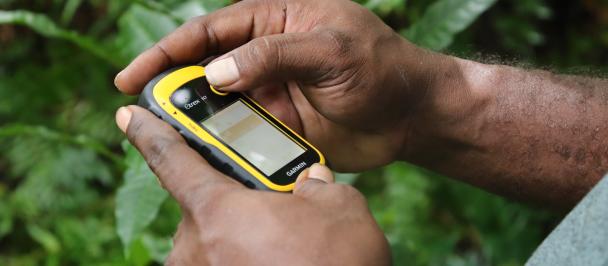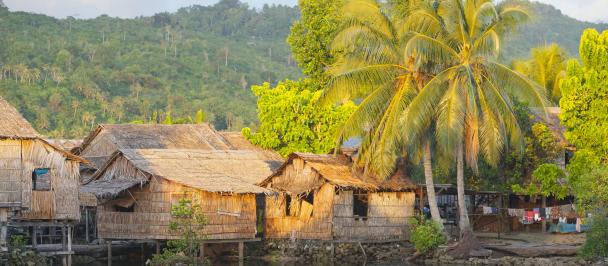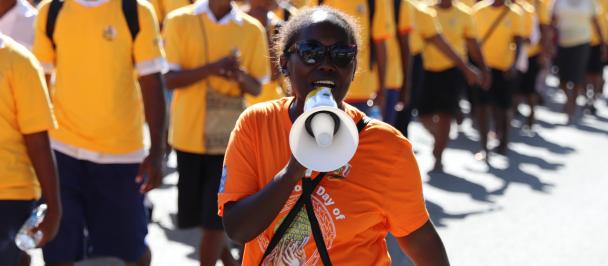Land is entrenched in Solomon Islanders' DNA - it plays a great role in the nation's culture and traditions. Most importantly, people's lives and livelihoods depend on the land and its resources.
About 85 percent of landmass in Solomon Islands is customary land, regulated by unwritten laws and oral tradition passed down from generation to generation. Today, the main challenge in the Solomon Islands is that customary usage is not a universally accepted body of rules or practice. To address this, the process of recognizing, and subsequently, recording customary land played a significant role in conflict prevention. Moreover, within the recording, people learn more about their rights and boundaries.
In 2020, the UN Development Programme in Solomon Islands partnered with the Solomon Islands Government through the Ministry of Lands, Housing and Survey to launch the customary land recording process in three target provinces – Malaita, Western and Guadalcanal.
The Customary Recording was carried out under the Customary Records Act and preceded by public awareness dialogues and consultations, boundary mapping and reconciliation between customary landholding groups’ members. With the 2030 Agenda as a guiding thread, UNDP and UN Women worked together with the Ministry to ensure the inclusiveness of the consultation process. To this end, women, youth and people with disabilities have been actively involved in the consultation process.
In consequence, the Government made the Customary Land Recording policy as one of the biggest priorities for the country’s development. It involves preserving customary land information in a formal register, partnership in economic activities, fostering and maintaining confidence amongst leaders of customary landholding groups, making customary land accessible and available for development, and securing land rights.
Uniting traditional and modern worlds, the recording allows customary landholding groups to enjoy their land rights through full protection of the law and the ability to enter development activities without compulsory acquisition.
Western Province - A Place I Belong To
Land is ownership; when there is land, there are people and when there are people, there is land. When exploring the topic of land in the Western province, there is a sense of belonging to land - “a place I [the tribe] belong to,” as it is expressed in the Western Pidjin dialect.
Since olden times, the land has been connected to the identity of a person, and not possessing land meant not being linked to any community. Having land gave people a clear idea of who one is, and where they come from. In other words, land always defined people.
Most of the key tribes still in existence come from a group of skilled hunters, gatherers and navigators – these were men and women who truly lived off the land. Tomoko, or war canoes were carved, and homes were built from the wood of intentionally planted trees and shrubs. The land and the tribes are interconnected, as land plays an integral role in their identities. Through matrilineal lineages, genes are passed down; the double helix structure of DNA can symbolize how land is connected to its people. There is an important sense of tribal origin and identity that exists within the land.
Taking into account and respecting traditions of customary landholding groups in Western Province, the first of its kind land recording was completed in Patu Basiato, community. This served as a great example of recording, and most importantly, enjoying their land rights for other customary landholding groups.
“This is an extremely great achievement for our community, as we now have legal rights to our land. Let me express my deepest gratitude [to UNDP] for making possible the recording of our land rights and interest to become official and recognized under the Solomon Islands legislation,” said Ms. Rusila Posala, Representative of the Patu Basiato customary landholding group.
Malaita Province – land blo mi hem culture blo mi
There is an intrinsic connection between culture and land in Malaita – culture is people’s home, and land. Speaking about culture means speaking about forefathers, and how everyone exists in relation to community, home, and tribe.
“The documentation of our tribal lands contributes to the decrease of land disputes among tribes because the process clearly records boundaries and genealogies of respective tribes. Our House of Chiefs encourage more tribal landholding groups to apply for the recording process,” said Mr. Martin Horihua, Spokesman Chief of the Rokohariharina House of Chiefs at the handover ceremony.
Even though, for Malaitans land is often referred to as motherland, as it has taken care of many generations, generally men are heads of the community and are entitled to land. The land transfer process is a complex one. Followed with a rich cuisine, a large feast is held to honor the person who is giving away the land. Other landholding groups’ chiefs are called to join the feast and witness the land handover as evidence of transaction taking place in absence of written documentation.
As part of the recording process, UNDP and the Ministry of Lands, Housing and Survey worked with customary landholding groups in the East Are’are region of Malaita Province. The collaboration resulted in a Certificate of Completion of land recording.
“Land recording is a platform for reconciliation and peacebuilding, and it truly promotes reconciliation, restitution and restoration amongst our tribe. The handing over ceremony has given us a sense of belonging. We used to recite our custom stories but now they form an official record that will be kept safe and secure for our future generations,” said Mr. Enoch Naomane, Spokesman Chief on behalf of three East Are’Are landholding groups.
Guadalcanal Province
Matrilineal systems play an important role in the tribes and societies of Solomon Islands. In the Guadalcanal Province, there is a particular process for land ownership, especially when a man is married to a woman from a different province.
In the Guadalcanal Matrilineal system, if a male has sisters, he must recompense his mother and sisters for his children to benefit from that land. Notwithstanding, men are beneficiaries who cannot directly transfer rights of use of the land to their children; instead, they serve as spokespersons and chair the decisions taken by women leaders of the tribe with regard to the use of land.
A chupu is a ceremony that represents the disposition of land . Before handing over the land, both sides should agree on identified boundaries and invite other community members to take part in a boundary walk to view the landmarks that determine the land’s boundaries. The chupu is a ceremony of understanding and agreement, and it plays a significant role in conflict-solving. During the event, important ceremonial food and items are gathered to celebrate and respect other tribal members, including traditional shell money - malona and kongana.
Speaking from today’s perspective, people from Guadalcanal would say that the customary land recording is the chupu ceremony but only with land to be recognized by legislation.
Sahalu ward became the first one in Guadalcanal Province who completed the customary land recording exercise. People as one claimed that “this is a great accomplishment and their legacy now.”
“This ceremony has given us a sense of belonging. We used to recite our custom stories, but now they form an official record that will be kept firm and safe for our future generations,” says Mr Remi Liulonga on behalf of the Sahalu House of Chiefs.
For more information or media inquiries:
Anastasiia Tiurmenko, Communications Specialist, UNDP Solomon Islands Office, anastasiia.tiurmenko@undp.org, +677 27 446/ +677 747 21 29

 Locations
Locations








